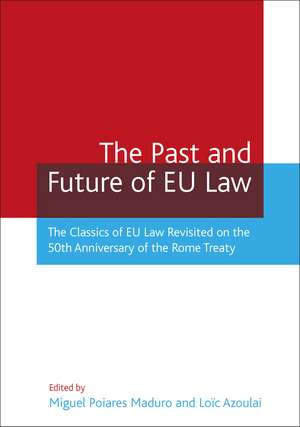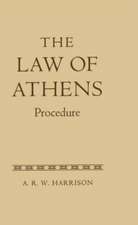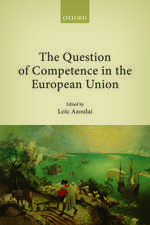The Past and Future of EU Law: The Classics of EU Law Revisited on the 50th Anniversary of the Rome Treaty
Editat de Luis Miguel Poiares Pessoa Maduro, Professor Loïc Azoulaien Limba Engleză Paperback – 4 feb 2010
Preț: 722.26 lei
Preț vechi: 1032.22 lei
-30% Nou
138.25€ • 150.22$ • 116.20£
Carte tipărită la comandă
Livrare economică 21 aprilie-05 mai
Specificații
ISBN-10: 184113712X
Pagini: 526
Dimensiuni: 156 x 234 x 26 mm
Greutate: 0.91 kg
Ediția:New.
Editura: Bloomsbury Publishing
Colecția Hart Publishing
Locul publicării:London, United Kingdom
Caracteristici
Notă biografică
Miguel Poiares Maduro is Professor and Director of the Global Governance Programme at the European University Institute and Visiting Professor at Yale Law School. Loic Azoulai is a former Legal Secretary at the Court of Justice of the EC, and is currently Professor of Public Law at the University of Pantheon-Assas (Paris-II).
Cuprins
Preface: Joseph Weiler Introduction: Miguel Poiares Maduro and Loic Azoulai Van Gend & Loos Pierre Pescatore Bruno de Witte Daniel Halberstam Franz Mayer Costa/ENEL and Simmenthal Nial Fennelly Ingolf Pernice Stephen Breyer Carlo Santulli Internationale Handesgeselschaft and Nold Jose Narciso da Cunha Rodrigues Takis Tridimas Brun O. Bryde Mattias Kumm ERT and Wachauf Francis Jacobs Damien Chalmers Rubio Llorente Zdenek Kuhn CILFIT and Foto Frost David Edward Paul Craig Alec Stone Daniel Sarmiento ERTA and Open Skies and Opinion ECHR Jean-Pierre Puissochet Piet Eeckhout Robert Post Christophe Hillion Defrenne Eleanor Sharpston Denys Simon Elaine Vogel-Polsky Siofra O'Leary Les Verts vs Parliament Koen Lenaerts Jean Paul Jacque Neil Walker Edoardo Chiti Martinez Sala and Baumbast Christiaan Timmermans Jo Shaw Carlos Closa Augustin Menendez Francovich Damaso Ruiz-Jarabo Colomer Francis Snyder Roger van den Bergh Julio Baquero Dassonville and Cassis de Dijon Allan Rosas Kamiel Mortelmans (Alan Dashwood) Kalypso Nicolaides Nicolas Bernard Bosman Marko Ilesic Stephen Weatherill Petros Mavroidis
Recenzii
... an authoritative work in the bibliography on landmark decisions of the Court of Justice ... this volume contains contributions that involve essential methodological issues for any solid research in the field of EU law.
This is one of those books that has an undeniably magical side to it, despite the fact that the law should obviously be an austere discipline.[The book] give[s] life to an 'ideal interpretation' of the European Court of Justice's most important decisions and which, from a variety of points of view, enable[s] the reader to establish an informed opinion on the basis of a balanced calculation of past events.
This collection is an enjoyable read.
I cannot think of another book that presents and explains the foundational judgments of the Court in such a clear and lively way...an excellently presented precis of current and past mainstream doctrinal thought.Gareth DaviesEuropean Law ReviewVolume 37, 2012 ... an authoritative work in the bibliography on landmark decisions of the Court of Justice ... this volume contains contributions that involve essential methodological issues for any solid research in the field of EU law.Mihai BanuRevista Romana de drept EuropeanNo 3, 2011This is one of those books that has an undeniably magical side to it, despite the fact that the law should obviously be an austere discipline.[The book] give[s] life to an 'ideal interpretation' of the European Court of Justice's most important decisions and which, from a variety of points of view, enable[s] the reader to establish an informed opinion on the basis of a balanced calculation of past events.Michel TheysAgence Europe: Bulletin Quotedien Europe27th April 2010 This collection is an enjoyable read.Marc JacobEuropean Law Books WebsiteOctober 2010
Descriere
In a new light, this book revisits some of the classic cases which constitute the foundations of the EU legal order, and it is timed to celebrate the 50th anniversary of the Rome Treaty establishing a European Economic Community. Its broader purpose, however, is to discuss - from a variety of different perspectives - the future of the EU legal order by examining the most important judgments of the European Court of Justice, which established the foundations of the EU legal order. The viewpoints in the collection come from a distinguished line-up of contributors, such as former and current members of the Court (the view from within), scholars from other disciplines or lawyers from other legal orders (the view from outside), and two different generations of EU legal scholars (the classics revisit the classics and a view from the future). Each of these groups will provide a different perspective on the same set of selected judgments. Questions are posed and answered, such as: What would EU law have been without this judgment of the Court? What factors might have influenced it? Did the judgment create expectations which were not fully fulfilled? The result is a profound, wide-ranging, and fresh examination of founding cases of EU law.












